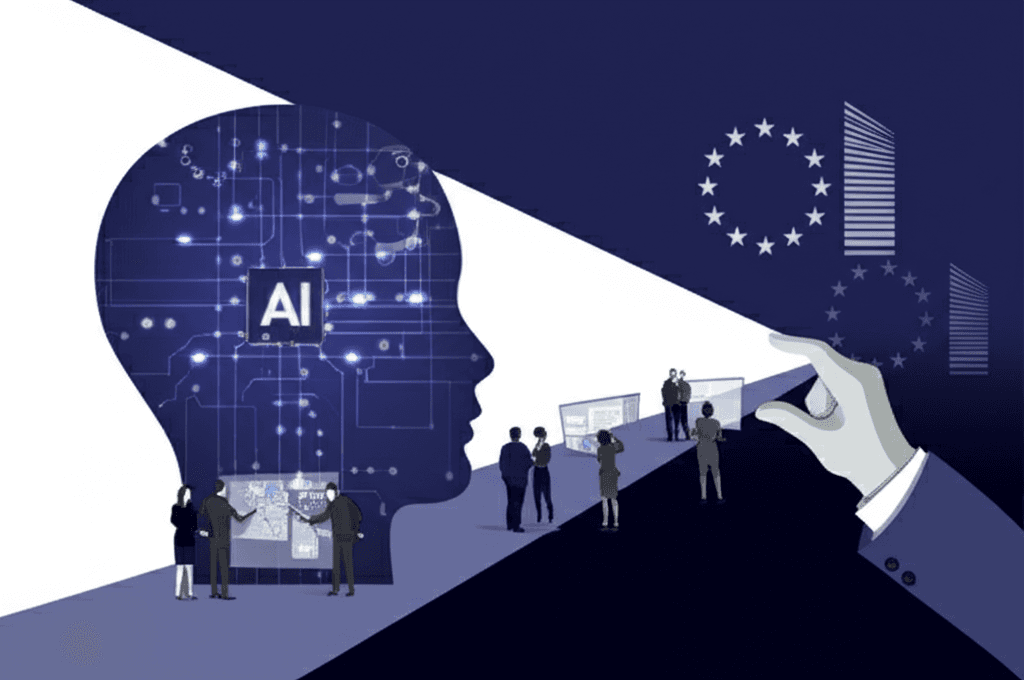EU AI Act Transforms AI Literacy from Advantage to Legal Necessity
Navigating the EU AI Act: Why foundational AI literacy for your workforce is now a legal obligation, not an option.
July 11, 2025

The European Union's landmark Artificial Intelligence Act is more than just a new set of rules for tech companies; it's a fundamental wake-up call for the entire business world, signaling that a baseline understanding of AI is no longer optional.[1][2] Buried within the world's first comprehensive law on AI is a crucial, and often overlooked, provision that mandates a sufficient level of "AI literacy" for any staff involved in the operation and use of artificial intelligence systems.[3][4] This requirement, which came into effect in early 2025, effectively transforms data and AI literacy from a competitive advantage into a legal necessity, forcing organizations to confront the skills gap within their own ranks and invest in foundational knowledge as a prerequisite for responsible AI implementation.[5][6]
The AI Act's literacy mandate, specifically outlined in Article 4, requires that providers and deployers of AI systems take measures to ensure their personnel have a sufficient understanding of the technology.[4][7] This isn't a vague suggestion but a direct obligation to equip employees with the knowledge, skills, and understanding to make informed decisions about how AI is used and to be aware of its potential risks and opportunities.[8][1] The regulation is context-dependent, meaning the required level of literacy scales with the complexity and risk level of the AI system in question.[3][9] For instance, employees interacting with high-risk AI systems, such as those used in recruitment or critical infrastructure, will need much more in-depth and specialized training covering technical, ethical, and legal implications compared to those using a limited-risk tool like a chatbot.[10][11] This risk-based approach categorizes AI into unacceptable, high, limited, and minimal risk tiers, each with corresponding obligations.[12][2] The core purpose is to ensure that human oversight is meaningful and that individuals interacting with these powerful systems can identify and mitigate potential harms like bias, discrimination, and privacy violations.[13][14]
Beyond mere compliance with the AI Act's provisions, which can carry hefty fines for non-adherence, fostering widespread AI literacy presents a significant opportunity for businesses.[13][15] Companies that proactively invest in upskilling their workforce stand to gain a competitive edge through enhanced innovation, improved productivity, and increased employee confidence in adopting new technologies.[7][1] A workforce that understands the fundamentals of AI can better identify opportunities for its application, optimize internal processes, and contribute to the development of safer, more effective systems.[11][16] This moves the conversation from a reactive, compliance-driven mindset to a proactive strategy that integrates AI responsibly into the fabric of the organization.[1] Furthermore, in a tight labor market, demonstrating a commitment to employee development through robust AI training can be a powerful tool for attracting and retaining talent.[7]
To meet these new requirements, organizations must move swiftly to develop and implement comprehensive AI literacy programs.[3][6] Such programs should be tailored to different roles and responsibilities within the company.[6][17] For general staff, foundational training should cover the basic concepts of AI, machine learning, and generative AI, along with an understanding of ethical considerations and data privacy.[18][16] For more technical roles like data scientists and development teams, training must be more specialized, focusing on topics like bias detection and mitigation, algorithm transparency, and robust data governance.[10] Crucially, these training efforts must be documented to demonstrate compliance to regulators.[6] The market is already responding with a variety of training programs and resources designed to help organizations meet their Article 4 obligations, ranging from free courses for SMEs to bespoke corporate training modules.[19][20] The key is to create a culture of continuous learning that keeps pace with the rapid advancements in AI technology.[6]
In conclusion, the EU AI Act's AI literacy mandate serves as an inflection point, compelling organizations to prioritize the human element in the age of artificial intelligence. It codifies the principle that technology alone is not enough; a knowledgeable and aware workforce is the essential foundation for harnessing AI's potential while mitigating its inherent risks.[7] By treating this regulation not as a burden but as an impetus for strategic investment in human capital, companies can ensure they are not only compliant with the law but are also well-equipped to navigate the complexities of the AI-driven future.[1] The Act makes it clear that in the European Union and potentially beyond, as it sets a global benchmark, the responsible implementation of AI begins and ends with people.[2][15]
Sources
[1]
[2]
[3]
[5]
[8]
[10]
[11]
[12]
[13]
[14]
[15]
[16]
[17]
[18]